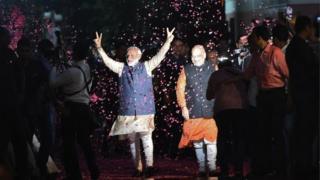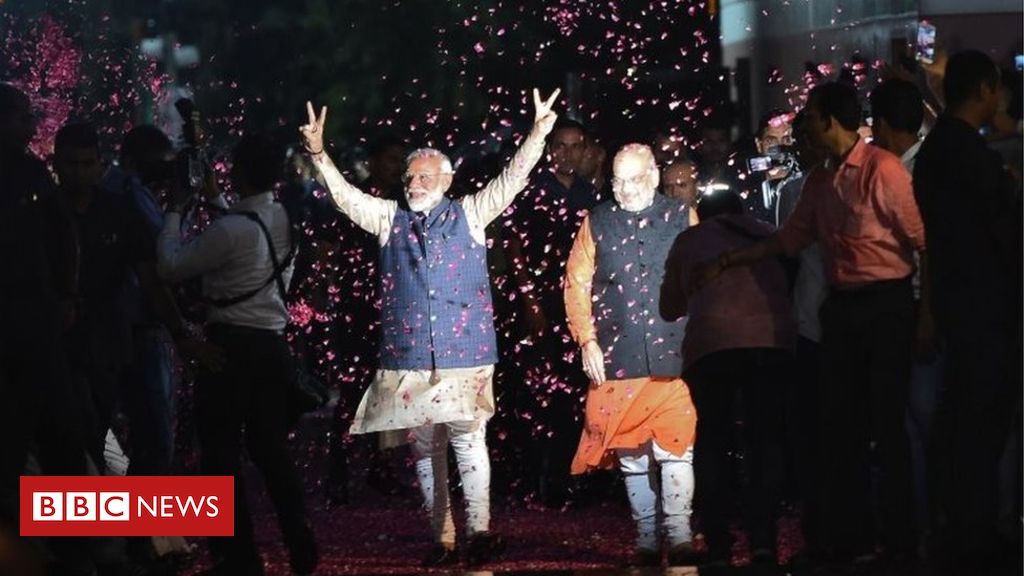 Image copyright
Image copyright
AFP
Mr Modi’s Hindu nationalist politics were under scrutiny in the marathon election
Prime Minister Narendra Modi has thanked the people of India for giving him a “historic mandate” of five more years in office, after a landslide victory in the general election.
“We all want a new India. I want to bow down my head and say thank you,” he said in a victory address to supporters of his Bharatiya Janata Party (BJP).
The BJP is projected to get about 300 of the 543 seats in parliament.
It is likely to take a larger share of the vote than in the 2014 elections.
The main opposition alliance, which is headed by Rahul Gandhi’s Congress party, has admitted defeat.
The general election was widely viewed as a referendum on the prime minister’s Hindu nationalist politics, and the victory was won despite growing unemployment, fears of a recession and a slump in industrial production.
Media playback is unsupported on your device
What are the results so far?
Partial and declared results show Mr Modi’s BJP is projected to win 300 seats on its own, and combined with the party’s allies, this number reaches nearly 350.
The main opposition Congress party is expected to win fewer than 60.
A party or coalition needs at least 272 seats to secure a majority in the 543-member lower house of parliament, or Lok Sabha.
In 2014, the BJP won 282 seats – the biggest victory by any party in 30 years – and with its allies it secured 336 seats in that parliament.
The Congress, which won just 44, suffered its worst defeat in 2014 and with its allies took up just 60 seats in the lower house.
More than 600 million people voted in a marathon six-week process, which involved seven rounds of voting.
What did Modi say?
The prime minister was showered with rose petals by thousands of supporters as he arrived at the BJP headquarters on Thursday evening.
“This election was fought not by politicians but the people of this country – but it’s the people of this country who have emerged victorious,” Mr Modi told supporters in Delhi.
“We will never give up our ideals, our humility and our culture,” he added.
Party members cheered, banged drums and set off fireworks when the results started to emerge.
‘Keeping the nation secure’
Narendra Modi made this an election all about himself.
He should have faced some anti-incumbent feeling. Joblessness has risen to a record high, farm incomes have plummeted and industrial production has slumped.
Many Indians were hit hard by the currency ban (also known as demonetisation), which was designed to flush out undeclared wealth, and there were complaints about what critics said was a poorly designed and complicated uniform sales tax.
The results prove that people are not yet blaming Mr Modi for this.
A combination of nationalist rhetoric, subtle religious polarisation and a slew of welfare programmes helped Mr Modi to coast to a second successive win. He also mined national security as a vote-getter in a manner never seen in a general election in recent history.
“It is all right if there’s little development, but Modi is keeping the nation secure and keeping India’s head high,” a voter in the eastern city of Kolkata told me.
Mr Modi is a strongman, and people possibly love him for that.
What reaction has there been?
At a press conference in Delhi, Congress leader Rahul Gandhi conceded the general election as well as his Amethi seat in Uttar Pradesh, which he had held since 2004 and his family had held for decades.
But he will still be in parliament as he contested and won another seat – Wayanad in Kerala.
Image copyright
Getty Images
Rahul Gandhi and his sister Priyanka failed to improve on a dismal Congress performance last time
The BBC’s Zubair Ahmed in Delhi says Congress Party staff, who had been hoping for a much improved performance, looked lost for words.
Messages of congratulation have been sent from a number of world leaders, including US President Donald Trump, Pakistani Prime Minister Imran Khan and China’s President Xi Jinping.
Where were the key contests?
The BJP alliance has been projected to win more than 50% of the vote in the huge northern state of Uttar Pradesh, which sends more MPs to parliament than any other state (80).
This took election observers by surprise as the party was expected to be seriously challenged by a tie-up between two powerful regional parties, the Bahujan Samaj Party (BSP) and Samajwadi Party (SP), which had previously been bitter rivals.
The BJP is doing better than expected in West Bengal, where it is projected to take 17 parliamentary seats – up from two in the last polls.
Four of India’s five southern states – Andhra Pradesh, Telangana, Tamil Nadu and Kerala – have long eluded the BJP and appear to have done so again in this election. They look set to take just three of the 91 seats up for grabs.
What challenges does Modi face?
In his victory speech, Mr Modi said there were only two castes in India now. “The poor and those who want to work to bring them out of poverty. We need to empower both.”
Growing unemployment and fears of a recession will see Mr Modi face demands to provide jobs for the millions of young people entering the labour market in coming months.
Under his first term, India’s economy – the world’s sixth largest – lost some of its momentum. A leaked government report this year put the unemployment rate at the highest it’s been since the 1970s.
Farmers in India will also be hoping he will prioritise the agricultural industry, after a crop glut and declining commodity prices saw their incomes stagnate.
Image copyright
Getty Images
India has seen huge protests by farmers in recent years
Many saw this election as a battle for India’s identity and the protection of minorities.
A strident – and at times violent – Hindu nationalism has become mainstream in the past five years, with increased attacks against minorities, including the lynching of dozens of Muslims accused of smuggling cows.
And national security was put into the spotlight after a suicide attack by a Pakistan-based militant group killed at least 40 paramilitary police in Indian-administered Kashmir in February.
India then launched unprecedented air strikes in Pakistan, prompting it to respond in kind and bringing the two countries to the brink of conflict.
